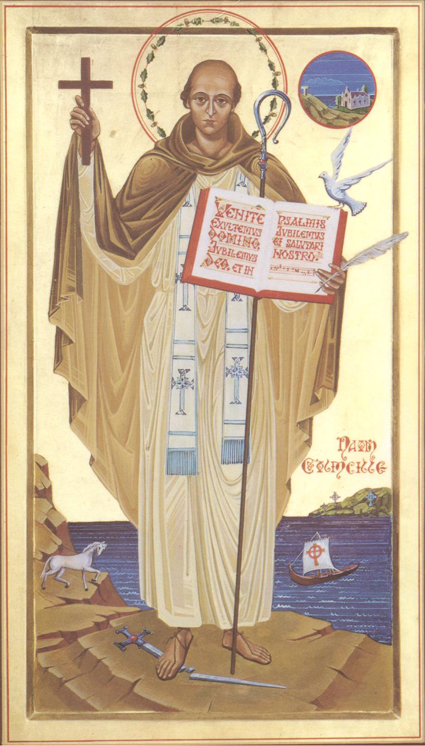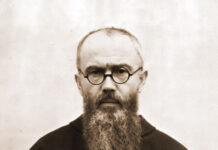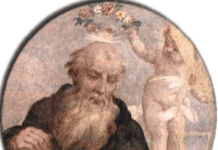If it ’twere not Pentecost Sunday – the second highest liturgical celebration in the Church’s calendar (see Pater Ignotus’ reflection), and a blessed one indeed to all our readers – we would ordinarily celebrate in our particular diocese today the feast of Saint Columbkille (521-597), an Irish monk from Donegal on the wild west coast of the emerald isle, whose Gaelic name means ‘dove of the Church’, a name which does not, ironically, fit either his historical appearance or demeanour. Columbkille is described as being of huge stature, with a strong, athletic build and a booming, melodious voice that could carry across hill and dale; he was also, apparently, an impetuous man of strong convictions, being involved, even helping to instigate, a minor war over the ownership of a manuscript he had copied from Saint Finnian, who wanted it back. An early case of copyright dispute (everything old is new again!), and those monks certainly treasured their writing. The details are obscure, but a number of men were killed, for which Columbkille felt deep repentance. The saint was also involved in an apparently more legitimate struggle with the local chieftain King Diarmait over the violation of sanctuary laws.
Columbkille was going to be excommunicated, a sentence which was commuted to exile, providentially so, for he sailed across the Irish Sea in a leather boat with twelve companions, and landed on Iona, a beautiful, small grassy island on the west of Scotland, just across from the much-larger Isle of Mull, where he set up the famous monastery, whose ruins still stand, after its destruction under the plundering iconoclasm of Henry VIII, now rebuilt, with perhaps somewhat lesser glory.
So it was an Irishman who brought the Catholic faith to Scotland, a fitting saint for this writer, born in Scotland, but of Irish lineage. I went on a personal pilgrimage to Iona years ago, standing on the very beach where Columbkille may have landed; looking down, I noticed all the stones were of a curious green tinge, and had this thought – Irish as I am – that they turned that colour when the Irish monk set his sandalled foot upon the shore. Columbkille was a missionary, a diplomat, a poet and, all in all, a saint, his early Gaelic temper apparently tempered, so that his reputation for holiness went far and wide. He rarely left Scotland, only twice, and was buried in the abbey on that green jewel of Iona where he had spent most of his life.
Both Scotland and Ireland need a good dose of re-evangelization, but the seeds of the faith, even in the very bones and relics of all those priests, monks, nuns and laity who carried the Faith for all those centuries until the rupture and upheaval of the ‘Reformation’. But there is hope that what once was can be again, even if only in a small, hidden way. That is how the Faith began, and that may be likely how it will be in the end.
Saint Columbkille, and all Irish and Scottish saints of yore, orate pro nobis!












